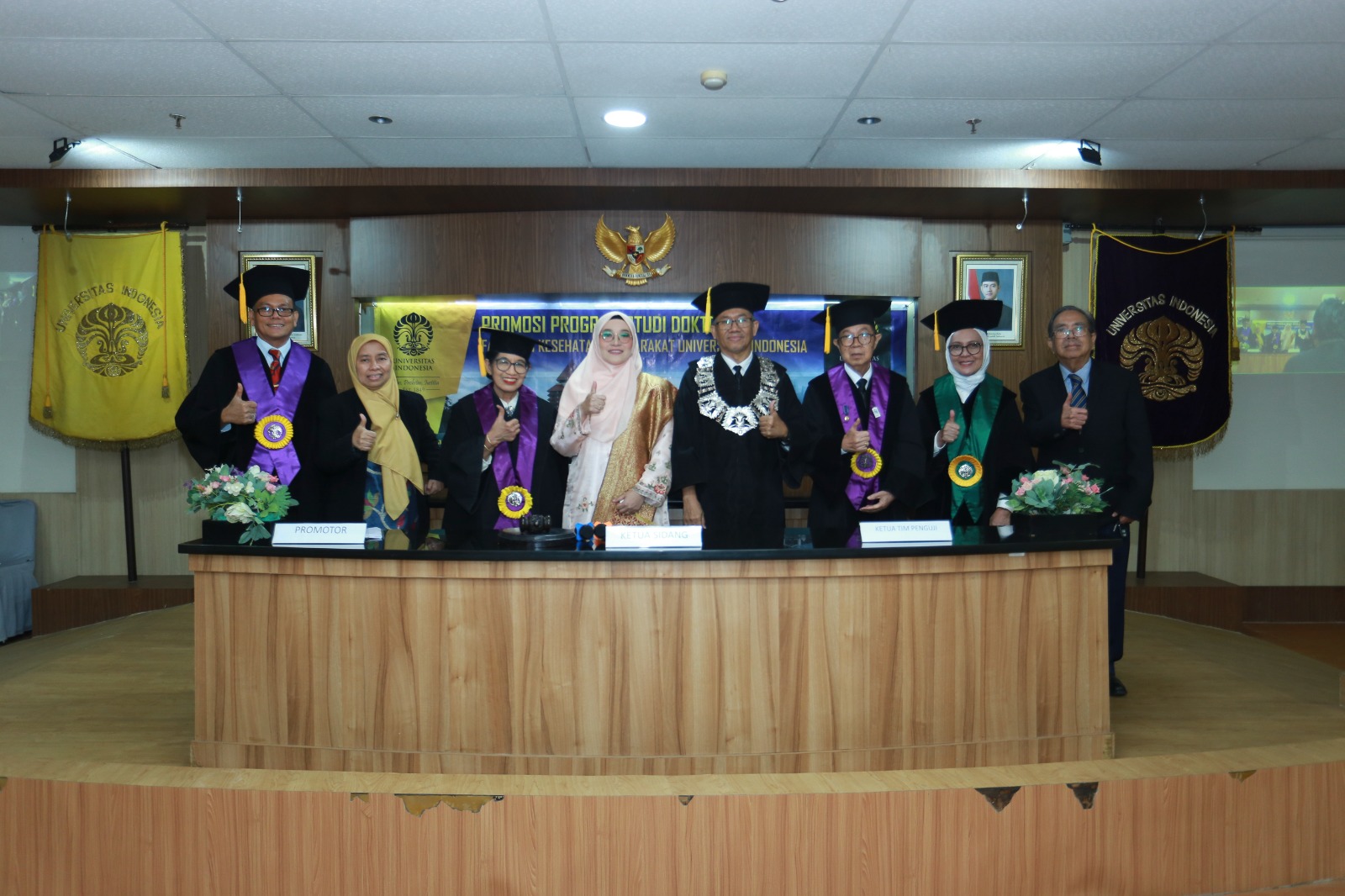On Tuesday, April 15, 2025, the doctoral Program in Epidemiology at the Faculty of Public Health (FPH), Universitas Indonesia (UI), held the open doctoral promotion defense of candidate Cici Apriza Yanti. The session was chaired by Prof. dr. Mondastri Korib Sudaryo, M.S., D.Sc., with Prof. Dr. dr. Ratna Djuwita, M.P.H., as Promoter, and Prof. Dra. Evi Martha, M.Kes., and Prof. Dr. Besral, S.K.M., M.Sc., as Co-Promoters. Examiners included Prof. Dr. Sudarto Ronoatmodjo, S.K.M., M.Sc.; Prof. Dr. Erwin, M.Si.; Prof. dr. Aida Lydia, SpPD-KGH, Ph.D.; Dr. dr. Helda, M.Kes.; and dr. Soewarta Kosen, M.P.H., Dr.PH.
Conducted in a hybrid format in the Doctoral Promotion Room of FPH UI, Cici Apriza Yanti defended her dissertation titled: “The Saiyo Sakato Social Support Model in Minangkabau Matrilineal Kinship and Its Impact on Hypertension Control Knowledge, Attitudes, and Practices.”
In her presentation, Cici explained that hypertension is a serious public health challenge in Indonesia. “Minangkabau culture has great potential to support hypertension management through its strong matrilineal kinship system and vibrant socio-cultural values,” she said. Her research aimed to explore existing social support within the Minangkabau community and to develop and test the culturally based “Saiyo Sakato” social support intervention model. This model involves traditional leaders (bundo kanduang, mamak, and tungganai), families, and health cadres in improving hypertension patients’ knowledge, attitudes, and behaviors.
The study used a mixed-methods exploratory sequential design in three phases: qualitative exploration of local cultural values; model development using the ADDIE framework; and intervention testing with a quasi-experimental design. Phase one involved 30 hypertension patients, 10 family members, 8 health workers, and 10 traditional leaders. Based on these findings, the culturally tailored “Saiyo Sakato” Social Support Model was developed into educational modules targeting patients, families, health workers, and traditional leaders. Feasibility testing on 25–30% of the target sample showed a module validity score ≥81% (very feasible category). Phase three tested the model’s effects using a pre–post control group design with 159 respondents: 53 intervention patients from four health centers in Bukittinggi and 106 control patients from six health centers in Payakumbuh and Bukittinggi, selected by proportional cluster random sampling at Posbindu sites.
Results showed significant improvements in knowledge (p<0.001), medication adherence, physical activity, stress management, healthy nutrition intake, and social support after the intervention. The “Saiyo Sakato” model increased patients’ hypertension knowledge by 8.15 points, attitudes by 3.66 points, and hypertension control behaviors by 11.09 points compared to the control group.
The “Saiyo Sakato” model proved effective in enhancing community-based hypertension control behaviors, controlling for sociodemographic variables such as age, BMI, education, and income. The model is recommended for integration into primary health care hypertension control programs, especially in regions with social and cultural structures similar to the Minangkabau community.
Based on these findings, Cici advised the Provincial and District/City Health Offices to integrate the “Saiyo Sakato” model into non-communicable disease control programs by incorporating cultural approaches into community-based hypertension SOPs; to strengthen partnerships with traditional institutions (LKAAM/KAN and Bundo Kanduang) by increasing their involvement in hypertension education campaigns and early detection in communities. The study is expected to contribute to academic knowledge and community service by strengthening the development of culturally based health interventions in Indonesia.
Cici Apriza Yanti successfully defended her dissertation and earned her doctoral degree in Epidemiology with cum laude honors. She is the ninth Epidemiology doctoral graduate of 2025, the 124th in the program’s history, and the 452nd doctoral graduate of FPH UI.

